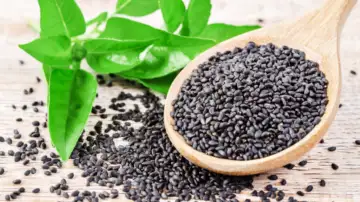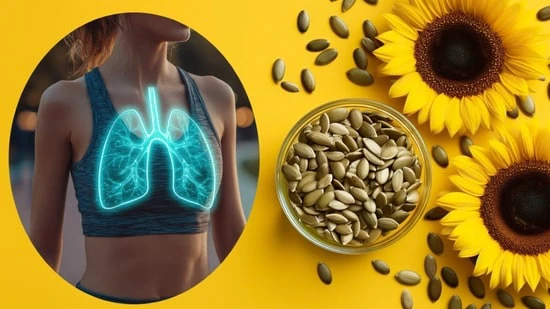Our lungs quietly work day and night, working tirelessly every second to keep us alive and energized. On World Lung Day, learn that protecting them is not just about avoiding smoke or pollution-what you eat can play a big role too.
According to nutritionist and holistic wellness coach Eshanka Wahi, certain seeds are more than just tiny powerhouses of nutrition. They may also support lung health in surprising ways. Seeds like chia, hemp, flax, and others are packed with omega-3 fatty acids, antioxidants, and anti-inflammatory compounds that can reduce airway inflammation, fight infections, and even protect against lung damage. While seeds are good for your overall health, they can also benefit your lung health too. therefore add them into your daily diet can be a good decision towards following a healthy lifestyle.
Best seeds for lung health
Here are 7 healthy seeds that can help improve lung function and keep problems at bay:
1. Chia seeds
Chia seeds are a rich source of fibre, omega-3 fatty acids, and antioxidants. A study published in the Pharmaceuticals journal even suggested their potential in fighting lung cancer. These tiny seeds can keep your respiratory system clean and healthy by reducing oxidative stress and supporting smooth breathing.
How to consume: Nutritionist Eshanka Wahi tells Health Shots that soaking chia seeds in water before use make them easier to digest. You can add them to smoothies, overnight oats, or mix into yoghurt for a refreshing, lung-friendly boost.
2. Hemp seeds
Hemp seeds are loaded with omega-3 fatty acids and gamma-linolenic acid, both known to calm airway inflammation. A study published in Food Chemistry Advances also found hemp seed oil beneficial in preventing lung infections, including fungal ones. This makes them an excellent addition to a lung-strengthening diet.
How to consume: Sprinkle hemp seeds over salads, blend into protein shakes, or add them to soups. Eshanka Wahi notes they blend easily into meals without altering the flavour much.
3. Flaxseeds
Flaxseeds are a powerhouse of omega-3 fats and lignans. Research in Cancer Prevention Research showed flaxseeds lowered lung tumor incidence in mice by 78%. Their anti-inflammatory effects help maintain open, healthy airways and reduce risks linked to chronic lung conditions. In fact, it can also lower the risk of lung-related inflammation.
How to consume: Grind flaxseeds before eating for better absorption. Add them to roti dough, baked goods, or simply stir into warm water. Wahi highlights that roasted flaxseed powder can be sprinkled on vegetables or dals for a nutty twist.
4. Basil seeds
“Known for their ALA content and antioxidant power, basil seeds may reduce lung inflammation and fight harmful bacteria,” says Wahi. A study published in Bulletin of Pharmaceutical Research found basil seed compounds effective against bacteria like Pseudomonas aeruginosa, which can cause pneumonia.
How to consume: Soak basil seeds in water until they swell and add them to lemon water, milk, or smoothies. They are especially refreshing during hot weather.
 5. Sunflower seeds
5. Sunflower seeds
Rich in protein, healthy fats, and antioxidants, sunflower seeds may protect against bronchial and pulmonary infections. A review published in Nuts and Seeds in Health and Disease Prevention found sunflower extracts effective against multiple respiratory conditions. Their chlorogenic acid may also slow lung tumor growth.
How to consume: Enjoy them roasted as a snack, mix them into trail mix, or sprinkle over stir-fried veggies and cereals.
6. Pumpkin seeds
Pumpkin seeds are abundant in carotenoids like beta-carotene, lutein, and zeaxanthin, known for their antioxidant and anti-inflammatory power. A study published in Molecules and Scientific Reports showed pumpkin seed oil reduced oxidative lung damage and inflammation in animal studies.
How to consume: Roast pumpkin seeds lightly with salt, add to soups or salads, or blend into dips. According to Wahi, pumpkin seed butter is another tasty option for breakfast spreads.
7. Sesame seeds
Sesame seeds provide magnesium, which helps relax airway muscles, and antioxidants that protect lung cells from oxidative stress. Regular intake may strengthen the bronchial system and reduce spasms, supporting easier breathing.
How to consume: Sprinkle sesame seeds on stir-fries, or blend into tahini paste for dips and dressings.
Frequently asked questions (FAQs)
1. How do seeds help in keeping lungs strong?
Seeds contain omega-3 fatty acids, antioxidants, magnesium, and plant compounds that reduce airway inflammation, fight infections, and support lung tissue health.
2. How many seeds should I eat daily for lung health?
A small handful or 1-2 tablespoons of mixed seeds daily is considered safe and beneficial, as advised by nutritionists.
3. What are the worst foods for lung health?
Highly processed foods, sugary snacks, and fried foods can worsen inflammation and harm respiratory health.
